Youth Involvement
By MEGAN MILLIGAN
Education Assistant, Prince William Sound Science Center
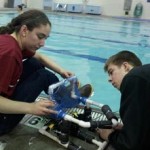
In March, educators from the Prince William Sound Science Center took their Discovery Outreach programs on the road to Kodiak and Valdez. They worked with high school and middle school students, teaching them about remotely operated vehicles, known as ROVs, and the challenges these vehicles face operating in Arctic ecosystems.
An ROV is a tethered underwater robot that can be operated from a boat or from shore. It is a valuable tool for exploring the ocean where it is either too dangerous or expensive for human divers. These vehicles can be used for a wide variety of tasks, including exploring shipwrecks, discovering deep sea animals and assisting with oil spill cleanups.
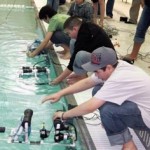
The students learned about the difficulties of operating in the Arctic environment, where hazards include incredibly harsh winters, extended periods of darkness and often unpredictable icepacks. Students then designed and built their own vehicle to respond to a mock oil spill. After splitting into “companies,” each group was given a bag of parts and a controller with three motors. The groups were free to build their own design with only a few restrictions.
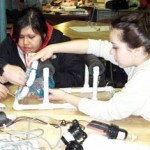
After building their vehicles, the students migrated to the pool, where the groups tested the buoyancy and balance of their machines. After some adjustments, students were ready to tackle the mock oil spill. The vehicles completed mock tasks such as transporting floating equipment by bringing a beach ball back to the side of the pool, delivering a piece of equipment to an underwater work station by driving through a submerged hula hoop, and taking a sample from a pool of oil in the ice by surfacing the vehicle inside a floating hula hoop. Students got competitive as they raced against the clock, trying to complete as many challenges as possible within the time limit. Groups also received points for good teamwork.
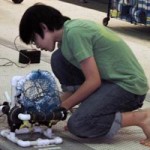
One of the most remarkable things was the wide variety of solutions the students came up with. No two vehicles were the same. All of the groups developed different strategies to accomplish the challenges as they were forced to think about new design and engineering problems. The students learned about new forms of technology and how they are being used, while having fun building and testing their own machine.
Students learned cooperation, innovation, communication and other skills which are essential for success in the 21st century. The Prince William Sound Science Center’s Discovery Outreach programs bring these hands-on experiences to communities around Alaska. Students involved with these programs develop into the future’s workforce and problem solvers, able to respond to the challenges of threatened natural resources.
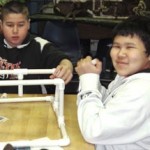
This outreach program was co-sponsored by the Oil Spill Recovery Institute and the council.